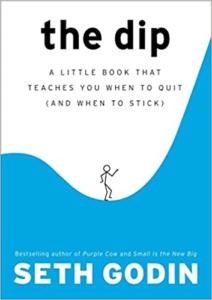In Blog Marketing, It’s Not Okay to Quit
“It’s okay to quit sometimes,” observes Seth Godin in his book the Dip, and, he assures readers, quitters do win. But quitting doesn’t mean giving up and abandoning your long-term strategy, only quitting the tactics that aren’t working. In fact, Godin admits, most people do quit. Problem is, he observes, they don’t quit successfully or at the right time.
Blogging is a perfect example, I realized, reviewing this powerful little book, of a long-term strategy that is too often abandoned due to short-term discouragement. The strategy itself is well-proven and documented, and many business owners and professional practitioners embark on blog marketing in recognition of its power to generate interest in their products and services. It’s the tactics, the week-after-week work of creating new, relevant, interesting, and results-producing…blog posts. Those abandoned blogs belong to those who don’t recognize what Seth Godin describes as the “extraordinary benefits that accrue to the tiny minority of people who are able to push just a tiny bit longer than most”.
It’s not that blog marketing is an unproven strategy…
“Content is still king, and it is the fresh, customized, customer-centric content that gets the attention. Those that create more of it will certainly see positive returns for their efforts. Content marketing generates at least three times more leads than conventional marketing techniques,” says Digital.com. People love engaging with businesses in particular, and they tend to look positively on a company that releases custom content…Over the long run, you can expect 87% more inbound links, compared to companies who don’t blog at all.”
“Know for a fact that Google and other search engines tend to give more weight and SEO boosts to websites that update their content regularly over those that aren’t so frequent. “ BlogPanda explains. “The more you blog regularly about your product, business or industry, the more it increases your search keywords which further helps your website rank better for those keywords on Google and other search engines.”
Amazing, but true: In the face of all these compelling reports demonstrating the value of blog marketing, Caslon Analytics tells us that most blogs are abandoned soon after creation (with 60% to 80% abandoned within one month!, 1.09 million blogs were one-day wonders, with no postings on subsequent days. The average blog, Caslon remarks ruefully, “has the lifespan of a fruitfly”. No lack of starts, though: blogtyrant.com reports that there are over 1.7 billion websites on the internet today, and more than 600 million of those have blogs.
“A blog usually starts with a bang,” observes Antonio Canciano of technicalblogging.com. Then life gets in the way, postnig becomes less frequent and ore sporadic until the blogger pretty much gives up on their site entirely. That’s the usual path to blog despair, Canciano says. However, blogging is a river, not a lake, he cautions, and the constant stream of new content is what gives blogging its edge over other forms of content publishing.
Sure, it may be okay to quite sometimes, as Seth Godin observes, but not if you’re after those extraordinary benefits that accrue to the tiny minority of people who are able to keep posting blogs!.


Leave a Reply
Want to join the discussion?Feel free to contribute!